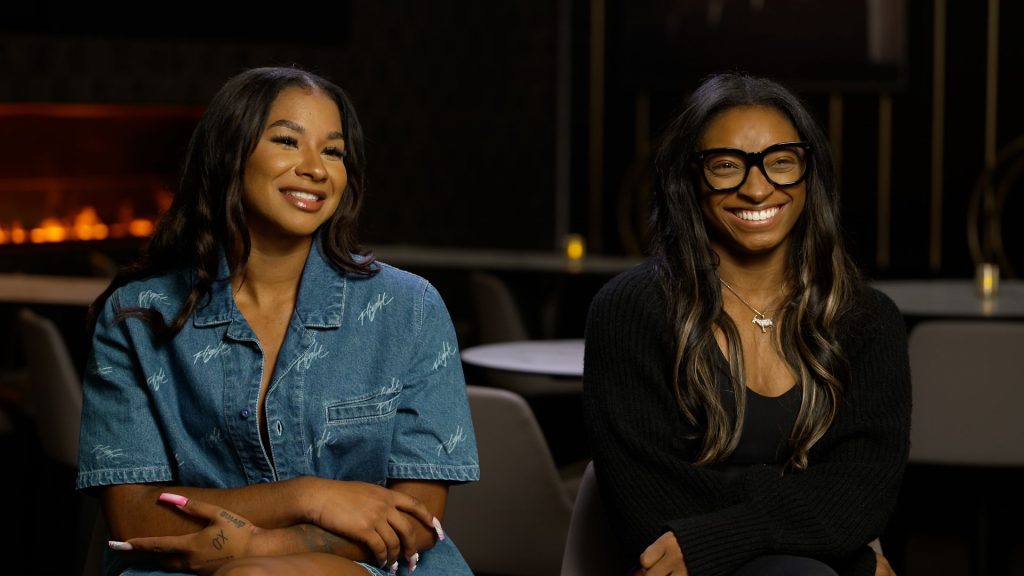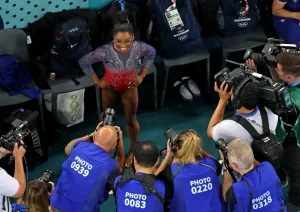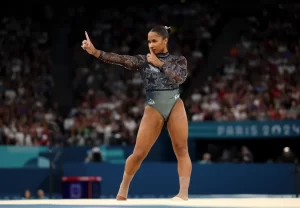“Embracing Vulnerability: Simone Biles and Jordan Chiles Discuss the Power of Leading by Example”
4 min read

On July 28, 2021, as the world learned that Simone Biles had withdrawn from the gymnastics all-around competition at the Tokyo Olympics, her friend and teammate Jordan Chiles felt the weight of that moment. “She’s not a quitter,” Chiles reflected at the time. “But … she knows her body more than anybody else.”
Rather than shying away from the public eye, Biles used this opportunity to open up about her mental health struggles, becoming a powerful voice in an important conversation. “Everybody’s mental health journey is unique,” she shared in a recent interview with CNN’s Coy Wire alongside Chiles in Los Angeles. “I’m not the poster child for it, but I’ll support anyone’s mental health journey.”
Biles recounted how the impact of her candidness has reached others: “Now people come up to me and they’re like, ‘I’ve been in therapy for the first time in my life, and thank you so much.’ There’s power in that. And I just know I’m helping people out there.”
Chiles, a two-time Olympian who participated in both Tokyo and Paris, emphasized how Biles’ example has positively influenced her life and the lives of others. During their recent Gold Over America Tour, which celebrated Team USA’s gymnasts, Chiles remarked, “Being in that position that she was in during that time frame and her being vulnerable made it even better for not just me, but for everyone around us.”
She continued, “Having somebody like her—whether people see it or don’t see it—I’ve been behind the scenes of what she’s gone through. It’s definitely cool to finally see that people are understanding where she’s coming from, not just as an athlete, but as a human.”

Now 27, Biles has amassed an incredible legacy, with 11 Olympic and 30 World Championship medals to her name. If she could impart one piece of wisdom to her younger self, it would be to “ask for help.” “There is beauty in being vulnerable,” she said, highlighting the importance of embracing one’s struggles.
Chiles, 23, has also adopted this mindset, recognizing the significance of vulnerability in her own journey. “When I was younger, I did not want help from anybody,” she admitted. As she prepares to return to UCLA as a collegiate gymnast, she reflects on how Biles’ example has encouraged her to stand firm in her identity. “I didn’t learn to stand my ground until I met her,” she noted.
This lesson has been particularly relevant for Chiles in recent months as her team seeks to contest a decision that stripped her of her bronze medal in the individual floor event at the Paris Olympics. “Things can be really, really hard in your life, and things may be stripped from you. You have to deal with that and fight for what you believe in,” she explained.
Biles sees her continued presence in gymnastics as a sign of progress, especially in a sport where female athletes often peaked at 16. By competing at the highest level, she serves as a mentor to younger gymnasts like Team USA’s Hezly Rivera, who was just 16 during the recent Paris games. “I’ve been in these girls’ shoes before, so I know exactly what they’re going through,” Biles said, emphasizing her role in offering support and encouragement.

Chiles credits Biles for shaping her own approach to leadership. “That’s just me being me,” she said, expressing her desire for the younger generation to embrace their authentic selves. “But I didn’t learn that until it came from her. She taught me that.”
Biles and Chiles believe they have contributed to breaking down barriers in gymnastics, pushing for greater representation and acceptance in the sport. “We’ve broken so many barriers,” Biles noted, highlighting the changes in hair color and style that symbolize a shift in norms. “It doesn’t matter your background or where you come from; we’re all capable of achieving amazing things.”
Together, Biles and Chiles exemplify the power of vulnerability and the importance of supporting one another in the pursuit of excellence. Their leadership serves not only as a source of inspiration for future generations but also as a reminder that true strength lies in embracing one’s true self.